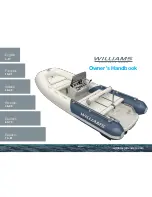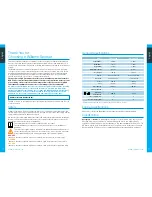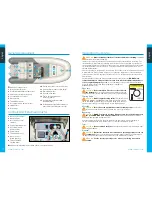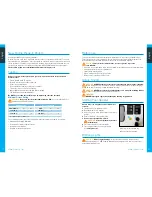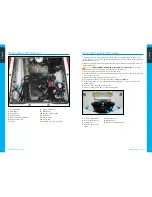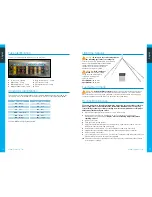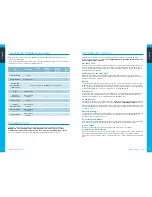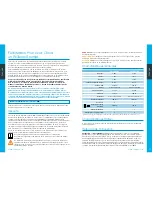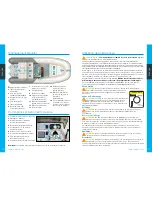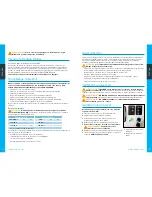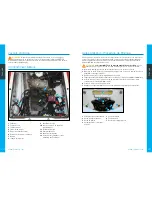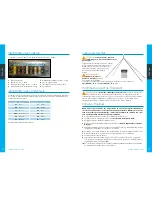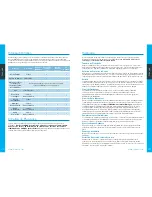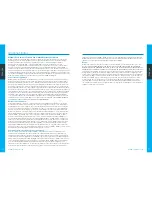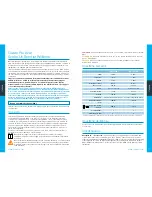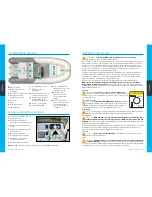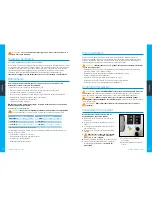
williamsjettenders.com
williamsjettenders.com
6
English
English
Operating Your Tender
WARNING.
Manoeuvrability of the boat is restricted while decelerating.
Familiarize
yourself with the boat’s handling.
This boat uses a water-jet propulsion system and has unique characteristics in steering. The
throttle produces thrust from the jet pump, the directional control is provided by opening the
throttle and turning the wheel in the direction of your turn. High thrust will turn the boat sharply;
low thrust will produce less turning force. There is no rudder, so while underway there is no
steering without thrust.
If weed or debris gets caught in the jet unit during use cavitation can occur causing a decrease
in forward thrust. If this condition is allowed to continue the engine may overheat resulting in
serious damage. If there is any sign of debris or weeds etc. blocking the jet, remove the boat
from the water.
Switch off battery isolator and remove all debris from around the jet unit.
DO NOT make
repeated attempts to start your tender if it has been blocked or jammed by debris or
rope as engine damage may occur.
In case of difficulty consult your Williams authorized
dealer. (A full list of authorized dealers/engineers is available at
williamsjettenders.com)
Recovery
CAUTION.
Do not attempt to lift or recover the tender by
the transom.
Any stern-up angle will cause water to enter the
engine from exhaust system and will result in serious engine damage.
Towing Valve
CAUTION.
Risk of engine flooding exists.
Towing valve fitted.
Valve must be in CLOSED position when your tender is being
towed and OPEN position when your tender is being used. Failure to
observe correct valve position will result in serious engine damage.
Mooring
CAUTION.
Do not leave the Sportjet moored for extended periods
as this may
result in an accumulation of marine growth and a loss of performance.
Beaching
CAUTION.
DO NOT operate in less than 0.95 m/3 ft of water as debris may enter
the jet unit. DO NOT drive Sportjet onto beach.
Stop engine before beaching as
damage to pump/engine cooling may occur.
After beaching, move boat into deeper water and rock from side to side several times to
remove sand from intake area – failure to do so could cause damage to jet unit.
Trim
CAUTION.
Do not overload the boat.
At all speeds be aware of trim and keep weight
evenly distributed.
General
CAUTION.
Operate the boat with due care and at a speed appropriate to the sea
conditions.
Be aware of local laws and restrictions. Always carry out a visual check of
the boat and its components prior to use. Adhere to the maintenance schedule.
WARNING.
For the safety of passengers, do not use rear facing seats above
15mph.
General Arrangement
@
Indicates seating position
1
Bow cleat/Anchor point
2
Port/Starboard navigation light socket
3
Splash proof storage (under seat)
4
12v auxiliary power socket
5
Mooring cleat
6
Throttle/Shift control
7
Key switch/remote battery isolator
8
Lifting Points
9
Drain plugs
10
Towing valve (under seat in engine bay)
11
Stowed ski pole (under engine hatch)
12
Removable ski pole
13
All round white light
14
Engine flushing attachment
(next to jet pump)
15
Hull Identification Number (HIN)
(under platform)
16
Folding backrest (pull fabric handles on
either sides of backrest arms to fold)
Controls and Instrument Cluster
1
Gauge mode switches
2
Gauge display
3
Boat function control
switches
4
Engine start/stop button
5
Key switch/remote
battery isolator
6
Safety lanyard
7
Throttle/shift control
8
Music In socket
(within glovebox)
9
Tilting/removable
steering wheel
Note:
The helm assembly can be folded if there is a height restriction.
6
9
3
4
8
5
2
7
1
7
6
15
3
4
5
11
10
13
14
12
16
2
8
8
8
8
9
9
7
1
@
@
@
@
@


